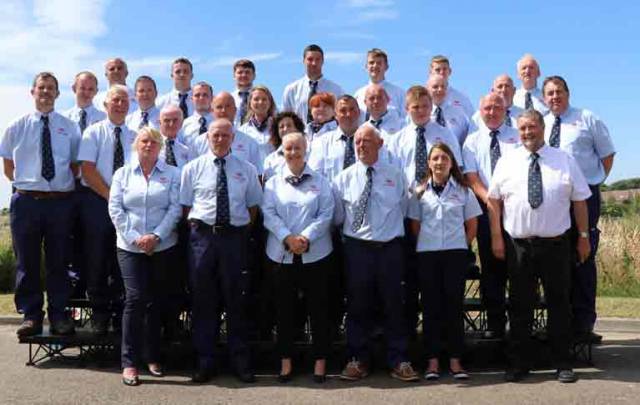Volunteers with Fethard RNLI gathered at the lifeboat station over the weekend (Saturday 30 June) for a naming ceremony and a service of dedication for their new lifeboat Naomh Dubhán. In glorious sunshine, operations crew, fundraisers, station management, friends and supporters came along to mark the occasion.
Oonagh Hearne Messette, Chair of the Fethard Fundraising Group represented all the members of the community, near and further afield, who had raised the funds necessary for the purchase of the €65,000 lifeboat. She passed the lifeboat into the care of RNLI Headquarters, which was represented by Joe Moore, Area Lifesaving Manager
In her remarks, Oonagh spoke about the appeal, ‘On the 20th of February 2016 we launched the Special Appeal to raise money for this Lifeboat. We completed the task in under a year. The fundraisers I am representing here are from Rinn Dubhán, which is the whole peninsula and from Carrig–on–Bannow, up to New Ross, over the river to Waterford and up to Dublin. The range of events and the money raised really shows the community spirit and commitment to our Lifeboat and by extension, the RNLI.’
Oonagh made special mention of the Waves Festival at Loftus Hall, which brought in half the total. ‘The support of Aiden Quigley, his family and staff; the sponsors, the volunteers on the day, and the organisational skill and determination of Rebecca Doyle led to an amazing unique event.’
As part of the ceremony, the lifeboat is passed from the Institution into the care of the station and its volunteers. Representing them, Tony Molloy, Fethard RNLI Deputy Launching Authority said, ‘While we are sad to say farewell to our previous boat, Tradewinds, which has served the station for the last ten years, we look forward to writing a new chapter in the station’s history with the arrival of this new D- class lifeboat.’
‘A fast and agile rescue boat, the D-class can be operated in surf, and in shallow water close to the beach. Because of its size, it is easily transported by road and launched at a number of different launch sites around the area, Fethard Dock, Slade, Duncannon, Ballyhack, St. Kearns, Barrystown and Cullenstown, depending on the location of the reported casualty.’
During the ceremony music was provided by Fethard RNLI Flash Mob Choir and Rev. Ivan Dungan carried out the service of dedication which included the lifeboat prayer.
John Hearne, Chairperson of the Fethard Lifeboat Management Group opened the proceedings and spoke of the incredible support the lifeboat volunteers received from their loved ones. He said, ‘For each volunteer with a role here at the station there are several more people in the background, maybe who didn’t actually volunteer at all for the job of being the one to keep family life on track while their other half is off life boating. And when the pagers go off and the 34 active operational members drop everything and hurry here to the station there could be someone waiting at home. While we sing the praises of the active volunteers today I want you to spare a thought for their support crew who enable them to carry on.’
The name Naomh Dubhán was chosen in recognition of the saint who came to the Hook Peninsula from Wales in 452 A.D and established a monastery. It is believed that St. Dubhán lit the first warning beacon for ships on the Hook Peninsula shortly after his arrival. This beacon was maintained by monks for 700 years until Hook lighthouse was built.































































